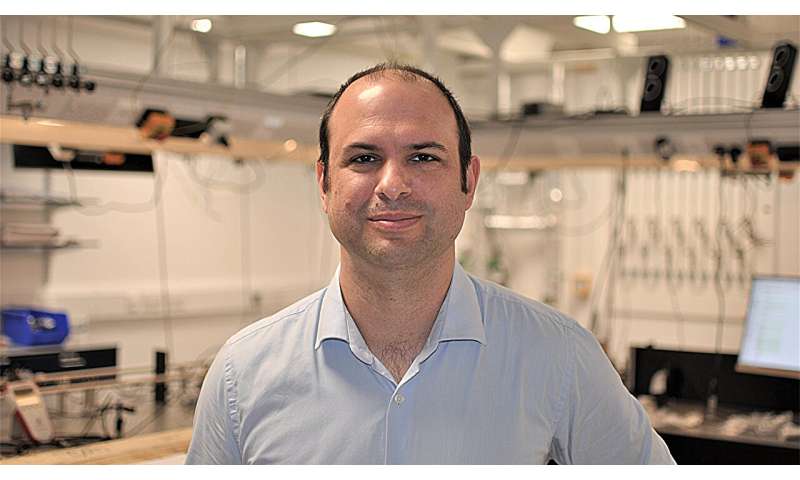Ultrafast laser scientist secures £2.5m to develop new technologies

An ultrafast laser scientist at Heriot-Watt University in Edinburgh, Scotland, has secured a prestigious £2.5 million engineering award for research that could lead to breakthroughs such as X-rays that image nature with unprecedented detail and speed and the development of microscopic mechanical devices.
John C. Travers, Professor of Physics at Heriot-Watt University and director of the Laboratory of Ultrafast Physics and Optics, has been awarded a Royal Academy of Engineering Chair in Emerging Technologies. The award aims to support 'global research visionaries' and provides 10 years of funding for emerging technologies with high potential to deliver economic and social benefits to the UK.
Professor Travers' research uses wave formations that were discovered in the Union Canal next to Heriot-Watt's Edinburgh campus 200 years ago by Scottish civil engineer John Scott Russell. The Heriot-Watt team uses these waves – as light waves rather than water waves – to create ultrafast optical pulses that are a million billionth of a second in duration. This is a measurement of time known as an 'attosecond.'
The process creates a high-performing form of bright ultraviolet light that has multiple transformational applications in sectors including manufacturing, electronics, artificial intelligence and drug discovery.
"If we can create these extremely short pulses of X-ray or electron beams, it means we can image, probe and control matter on the smallest possible spatial scale – on a tiny, microscopic scale – and also on the fastest possible timescale – simultaneously," Professor Travers explained.
"This can lead to advances like new materials, new drug discovery and more powerful computer chips – which underpin everything we do, from our mobile phones to artificial intelligence.
"It will also mean materials can be processed to produce much smaller structures, so you'll be able to manufacture micro machines or microscopic mechanical devices with great precision."
Last year's Nobel Prize in Physics was awarded for a breakthrough in attosecond science that enabled things to be measured over extremely fine timescales – like flash photography, but a billion times faster. But it is not currently possible to simultaneously measure things at extremely small spatial scales, Professor Travers explained.
A key feature of the ultraviolet system Professor Travers has invented is its tabletop size. This is tiny compared to the building-sized, multi-billion dollar machines currently used to generate ultraviolet and X-ray light sources, Professor Travers said. His system is already being used in 14 different labs around the world, including healthcare and semiconductor settings.
The funding that Professor Travers has been awarded focuses on developing ultrafast, bright ultraviolet X-ray and electron beams – which are both forms radiation – energy that travels through space at, or close to, the speed of light.
"The Royal Academy of Engineering award is fantastic because it provides long-term funding to underpin our research," Professor Travers said. "We will be able to recruit new academic staff at the assistant professor level and also build a centre of excellence in this area. So we're not just boosting what we do, but actually recruiting more expertise from around the world."
There are currently around 15 people in Professor Travers' research team, including Ph.D. students, postdoctoral researchers and junior staff members. Heriot-Watt University has "first mover" advantage in this field, Professor Travers added.
The Royal Academy of Engineering advances and promotes excellence in engineering. Its Chair in Emerging Technologies scheme is funded by the UK Department for Business, Energy and Industrial Strategy and has awarded more than £100 million to 43 Chairs since 2017. Professor Travers is one of four academics receiving a total of £10 million in this latest funding round.
Dr. Andrew Clark, Executive Director of Programmes at the Royal Academy of Engineering, said, "I am excited to announce this latest round of Chairs in Emerging Technology. The mid-term reviews of the previous rounds of Chairs are providing encouraging evidence that long-term funding of this nature helps to bring the groundbreaking and influential ideas of visionary engineers to fruition. I look forward to seeing the impacts of these four exceptionally talented individuals."
More information:
Official Royal Academy of Engineering news release: raeng.org.uk/news/10-million-a … and-societal-benefit
Notes to editors:
1. Image and captions in this Dropbox folder available for use:
www.dropbox.com/scl/fo/i15roam … eya10jpsx7ugk6s&dl=0
2. For media enquiries or media requests, please contact the Heriot-Watt University media team via mediaenquiries@hw.ac.uk Issued by Victoria Masterson. Office landline: +44 (0)131 451 3242 Mobile: 07933 701010
3. About Heriot-Watt
Heriot-Watt University is a global research-led university based in the UK, with five campuses in Edinburgh, the Scottish Borders, Orkney, Dubai and Malaysia.
Around 27,000 students from 154 countries are currently studying with us. We have 159,000 alumni in 190 countries.
We are specialists in business, engineering, design and the physical, social, sports, environmental and life sciences subjects which make a real impact on the world and society.
Heriot-Watt was founded in Edinburgh in 1821 as the world's first mechanics institute. In 1966, it became a university by Royal Charter. The university is named after 18th century Scottish engineer and inventor James Watt and 16th century Scottish philanthropist and goldsmith George Heriot.
86.8% of Heriot-Watt's research is classed as world-leading and internationally excellent in the Research Excellence Framework 2021 – the UK's system for assessing the excellence of research in UK higher education providers.
The university runs 113 undergraduate programmes and 170 postgraduate programmes across six academic schools and Edinburgh Business School.
Our six academic schools are:
• Energy, Geoscience, Infrastructure and Society
• Engineering and Physical Sciences
• Mathematical and Computer Sciences
• Social Sciences
• Textiles and Design
• Global College
Edinburgh Business School is one of the world's largest providers of postgraduate business education, with 49,000 alumni across 158 countries.
Website: www.hw.ac.uk/
Provided by Heriot-Watt University